
views
Breaking the Ice
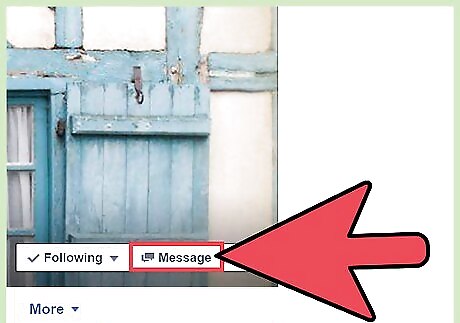
Stop thinking so much about it. If you're trying to get to know someone (and, perhaps, to woo them), the goal of these first few online conversations is to help them understand who you are as a person. You want to be yourself, and a script will only get you so far. Striking up a conversation online is hard for almost everyone. You're not the first, and you won't be the last. Worst case, it'll be a learning experience. Best case, you'll connect with somebody in a deep way. Neither case applies until you try.

Pick a convenient time. Try to message the person when they're online. It may be easier to get a conversation going in real-time than to count on someone to respond later on. Pick a time when you don't have anywhere to be. You don't want to be stressed-out, and you want to give the conversation a chance to grow.
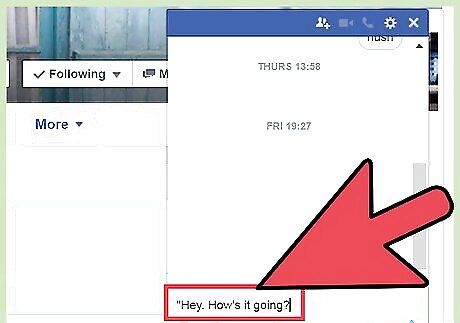
Start small. Send the person a short message and ask them how they're doing. A "Hey. How's it going?" will do. You may find that you feel much looser once you get the conversation going--there's no turning back now! They will likely respond with how they're doing, then ask you how you're doing. Be prepared to say how you're doing. Avoid dead-end answers like "I'm good." Anyone can be "good". Respond with something that tells your conversation partner about who you are, such as "I'm good! My friend and I explored this abandoned house up in the hills today. It was really cool but super spooky" or "My dance team just made it to nationals. I'm so excited!" Mention things that make you seem interesting, but avoid bragging.
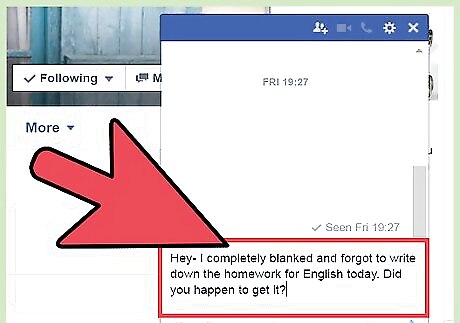
Ask about a common interest. This is a classic, tried-and-true conversation opener. If you're in a class together, ask what the homework assignment is. If you're in a club together, ask about an upcoming club event. This can break the ice in a very natural way, opening the gates to a deeper talk. Try something like this: "Hey- I completely blanked and forgot to write down the homework for English today. Did you happen to get it?" Or this: "Hey, do you know when our next track meet is? I must have tuned out when coach announced it during practice today..." Reader Poll: We asked 183 wikiHow readers, and 59% agreed that bonding over a common interest is a great way to start a conversation with someone online. [Take Poll]
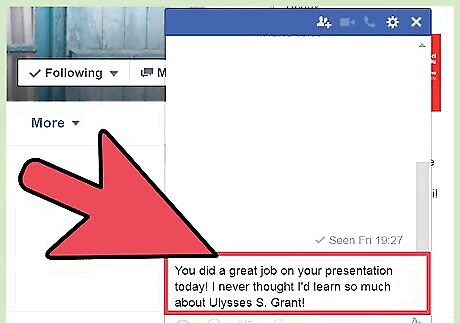
Compliment the person. If a person does something worthy of praise, it's natural to compliment them. This can be another great way to break the ice and make the person feel appreciated. Don't overdo it--be sparing with your compliments, or they may come across as flattery. If you're in a class together: "You did a great job on your presentation today! I never thought I'd learn so much about Ulysses S. Grant!" If you're on a team together: "Nice work in the 100-yard sprint at the meet today. You really put the team on your back"
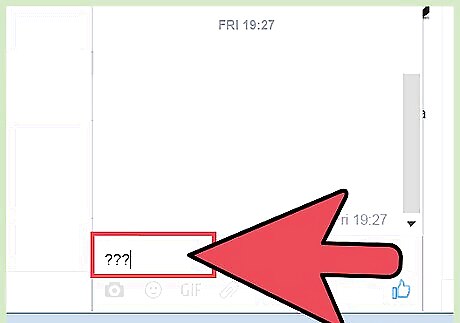
Ask a question. If you've met someone on a dating site like OKCupid or a dating app like Tinder, then you probably don't have any real-life connections to talk about. Ask the person an open-ended question about themselves. Take your inspiration from their profile. For example: "I see you're into hip hop. Been to any good shows lately?" Or: "I dig your beard. How long have you been growing that sucker?"
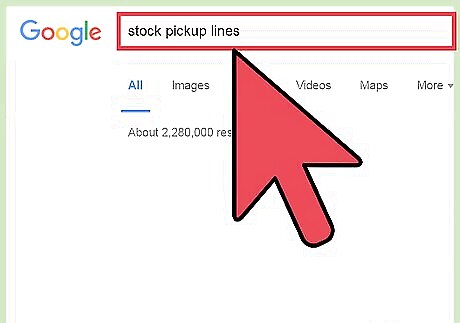
Be careful with stock pickup lines. Pickup lines can backfire: they work on some people, but they turn off others. These lines can come across as cheesy or manipulative, especially if they aren't something that you thought of yourself. Try to come across as genuine, and if that includes a pickup line--then you do you!
Keeping the Conversation Going
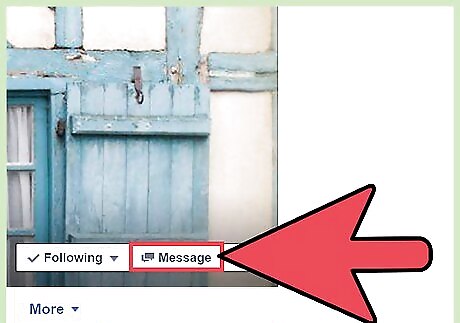
Be present and engaged in the conversation. Read and respond carefully. Conversation is all about taking cues and riffing off of what people say. While you are talking to the person, be aware of what the conversation has covered and where it is going. In this respect, talking to people online can even be easier than speaking in person. You should be able to scroll back through the conversation if you need to remember a specific detail.
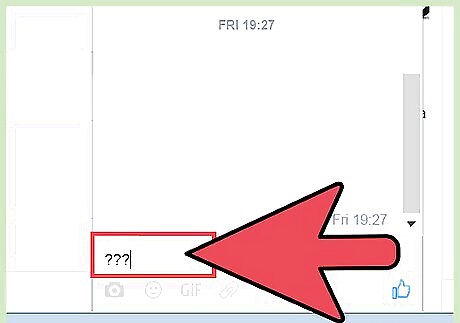
Ask questions. Be genuinely interested in the person. It's a scientific fact that people love to talk about themselves. If you ask questions about someone, odds are that they'll have a lot to say. Ask questions that lead into other questions. If you ask "So what kind of music are you into?" and they respond "I like a lot of music- some rock, some pop, some punk. I go to a lot of local shows"--ask them something like, "Been to any good shows lately?" Avoid asking yes-or-no questions. A simple "yes" or "no" can stop a conversation in its tracks. If you must ask questions with basic or binary answers, be prepared to ask follow-up questions.
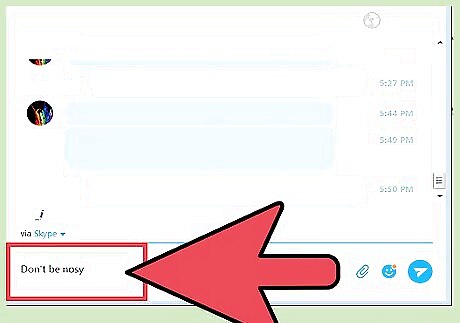
Don't be nosy. Be respectful of sensitive topics. You'll have to use your intuition on this one, but as a general rule of thumb: Don't ask anyone a question that you wouldn't want to answer yourself.

Turn your answers into questions. There is a back-and-forth flow to conversations, and you need to keep up your end if you want to keep the talk going. When you send a message, try to end each thought with a question that will prompt your conversation partner to respond. Think of a conversation like a game of catch. If you catch the ball, then that's great--but the game cannot go on until you throw the ball back to the other person. Do not merely say, "My day was good. I think I did really well on my math exam!" Say, "My day was good. I think I did really well on my math exam! How was yours?"
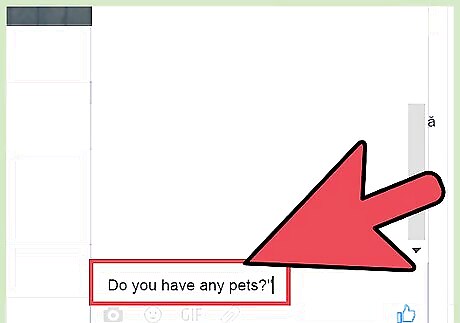
Don't be afraid to talk about yourself. There is a delicate balance to be struck here: if you dominate the conversation and only talk about yourself, you may come across as selfish or cocky; but if you don't let out any personal details, you'll just be another mystery. Be honest. If you weave a web of lies--building yourself up to be something you're not--it may come back to bite you later on. Things have a way of coming to light. If your conversation partner asks you about yourself, answer- but try to turn your answer back into a question. If they ask you about your dog, for example, consider something along the lines of: "His name's Duke. He's a border collie mix. We saved him from a shelter three years back, and he's like one of the family now. Do you have any pets?"
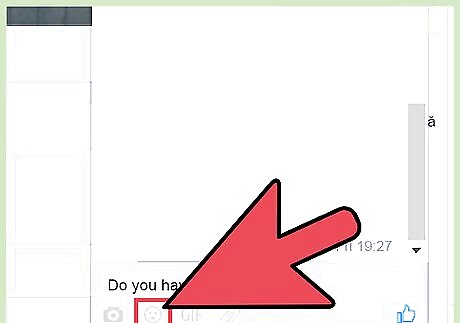
Use emoticons and emoji, but don't overuse them. Emoticons like ":)" and ":3" can give your words emotion and flavor to offset the detached online setting. They can endear you to a person and make you come across as more friendly. However, your emoticons can reveal much about your feelings: if someone uses a lot of smiley faces, for instance, there is a good chance that they like you. It is not wrong to reveal your feelings, but depending on the situation you may want to play it cool until you've gotten to know someone better. Be careful with your emoticons and what they tell your conversation partner. If you want to subtly let the person know that you're interested, then make use of the ":)". As a rule of thumb: use it at points in the conversation when you would actually smile in real life :)
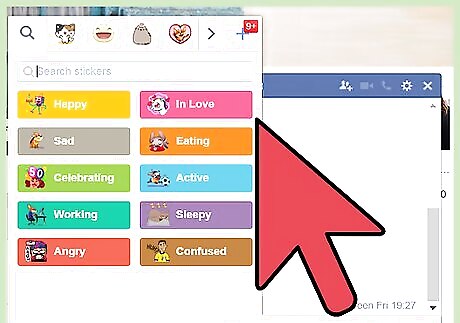
Don't force it. If the person is giving you one-word answers to questions, despite your best efforts, then they may just not want to talk to you right now. If the conversation seems forced, it's always okay to end the conversation and try again later. It is not necessarily your fault! It can be so difficult to tell how someone is feeling, especially online. For all you know, the person doesn't want to talk because they're feeling depressed, or they have a lot of work to do, or they've just had a fight with their parents. If you try to talk to someone over and over again and they do not seem interested in conversation--let it go. Try to get to spend more time with them in person, if possible, but only if you have a good reason to do so. Give them space. Nobody likes to feel pressured. It is better to let someone go than to make them feel uncomfortable.
Ending the Conversation and Making Plans
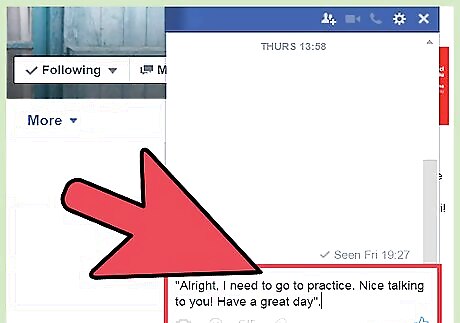
Talk until you don't have anything left to say. Perhaps you've genuinely run out of conversation topics, or perhaps you need to be somewhere. Either way, you will want to bid your conversation partner goodbye. Say something along the lines of, "Alright, I need to go to practice. Nice talking to you! Have a great day". Consider saying that you have to go, even if you don't actually have to go. This is an easy way to get out of a conversation without feeling rude.
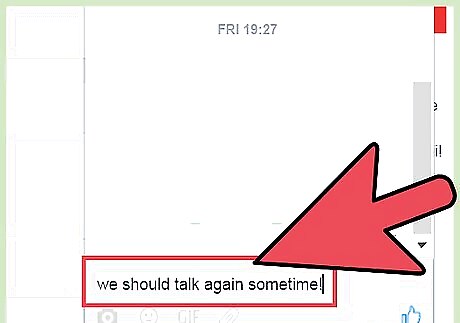
Don't feel the need to make formal plans. Online conversations follow a slightly different protocol than offline conversations. They're not so formal. Unless your conversation partner is subject to limited internet access, you don't need to arrange a "second date". At the most, you might say, "we should talk again sometime!" If the conversation went well, simply message the person again in a day or two when you are both online. This time, you should be more familiar with each other. Build upon the information and the jokes that the two of you shared in your first conversation. If your conversation partner can only access the internet at certain times or in certain places (say, for three hours each afternoon, or only at the public library), then feel free to make a formal plan. Type something like, "I really enjoyed talking to you. I know that you aren't online all the time- can I plan to talk to you again on Tuesday?"
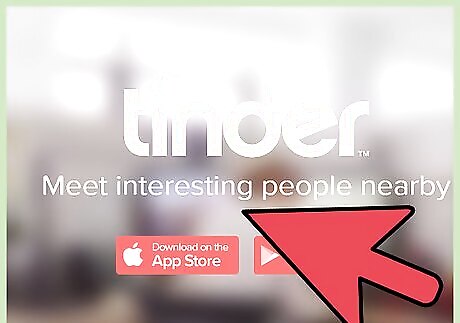
Be careful. If you make plans to meet up offline, exercise your best judgment about the situation. One conversation can only tell you so much, and people are not always who they say they are on the Internet. Consider talking with the person more online before you make the leap to meeting in person. If you are using an online dating site like OKCupid or Tinder, then you may very well decide to meet up with the person soon--or immediately. Again, exercise your best judgment. If you meet up with a stranger, tell a friend where you are going, and with whom. Bring your phone with you and, if possible, meet in a public place (such as a coffee shop) during the daytime.













Comments
0 comment